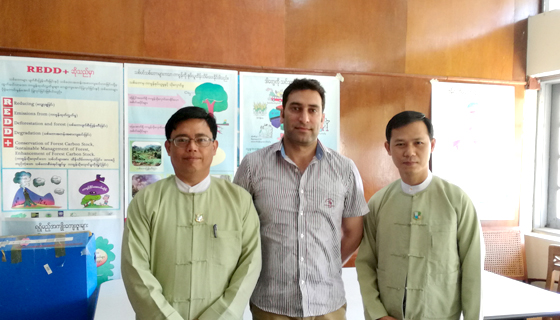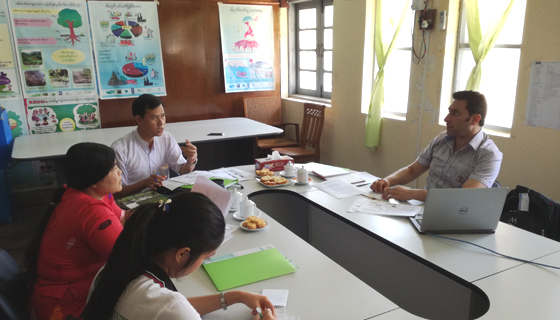Since the inception of the Initiative in Myanmar, partners have participated in a range of REDD+ Himalaya activities including a training on “financial procedures and disbursement mechanism” giving them insight into how to manage and administer the Initiative’s financial resources. In order to contribute to the establishment of a national forest monitoring system, a remote sensing workshop was conducted to build the capacities of relevant national officials and stakeholders in relation to REDD+ monitoring, and reporting and verification (MRV) in July 2016. In the framework of the South-South learning platform of REDD+ Himalaya, Myanmar also hosted a regional workshop on REDD+ MRV for the Initiative’s partner countries in October 2016.
 (L-R) Dr Thaung Naing Oo, Director, FRI, Myanmar; Mr Muhammad Sohail, REDD+ Specialist, ICIMOD; Mr Thein Saung, Staff Officer, FRI, Myanmar Photo: ICIMOD
(L-R) Dr Thaung Naing Oo, Director, FRI, Myanmar; Mr Muhammad Sohail, REDD+ Specialist, ICIMOD; Mr Thein Saung, Staff Officer, FRI, Myanmar Photo: ICIMOD
After receiving initial funding in the beginning 2017 and using already acquired capabilities, Myanmar partners are committed to actively implementing their work plan for the year. One of the highlights is the opening of the REDD+ Himalaya Initiative office that is now located at the premises of the Forest Research Institute (FRI) at Yezin, Nay Pyi Taw. External staff have been hired to support the Initiative’s day-to-day operation and suitable equipment will soon be acquired to make sure that everything runs smoothly. “The establishment of a REDD+ Himalaya project office within the premises of one of the partners in Myanmar indicates the dedicated efforts of FRI and the Forest Department, under the Ministry of Natural Resources and Environmental Conservation (MONREC), towards achieving their goals. This will support efficient coordination with ICIMOD and other regional partners as well as the effective implementation of activities on the ground,” says Muhammad Sohail, REDD+ Specialist at ICIMOD who met with partners recently to discuss progress in Myanmar. In addition, three villages in Taunggyi district of Shan state have been selected for the demonstration of REDD+ activities. After an inception workshop in January 2017, a public dialogue and stakeholder consultation meeting were organized to involve local communities and other actors right from the beginning. Stakeholders in Taunggyi will also play an important role in the analysis of deforestation and forest degradation in the area. The analysis will be conducted to contribute to Myanmar’s preparations for its national REDD+ strategy.
Several activities are planned for the first half of this year. Local communities will receive training on how to prepare a forest and carbon inventory, integrating them more and more into REDD+ processes by handing over forest monitoring responsibilities. Fuelwood issues and the reduction of human pressure on surrounding natural forests will be addressed by distributing fuel efficient stoves among farmers in the area. In order to supplement degraded community forests, enrichment planting will be carried out with the support of local people during the monsoon. In addition, community members from the three selected villages in Taungyyi and the REDD+ Himalaya Initiative staff of Myanmar will visit Nepal to get insight into the country’s community forest system and foster further regional cooperation on REDD+.
Source; ICIMOD | 18 April 2017














